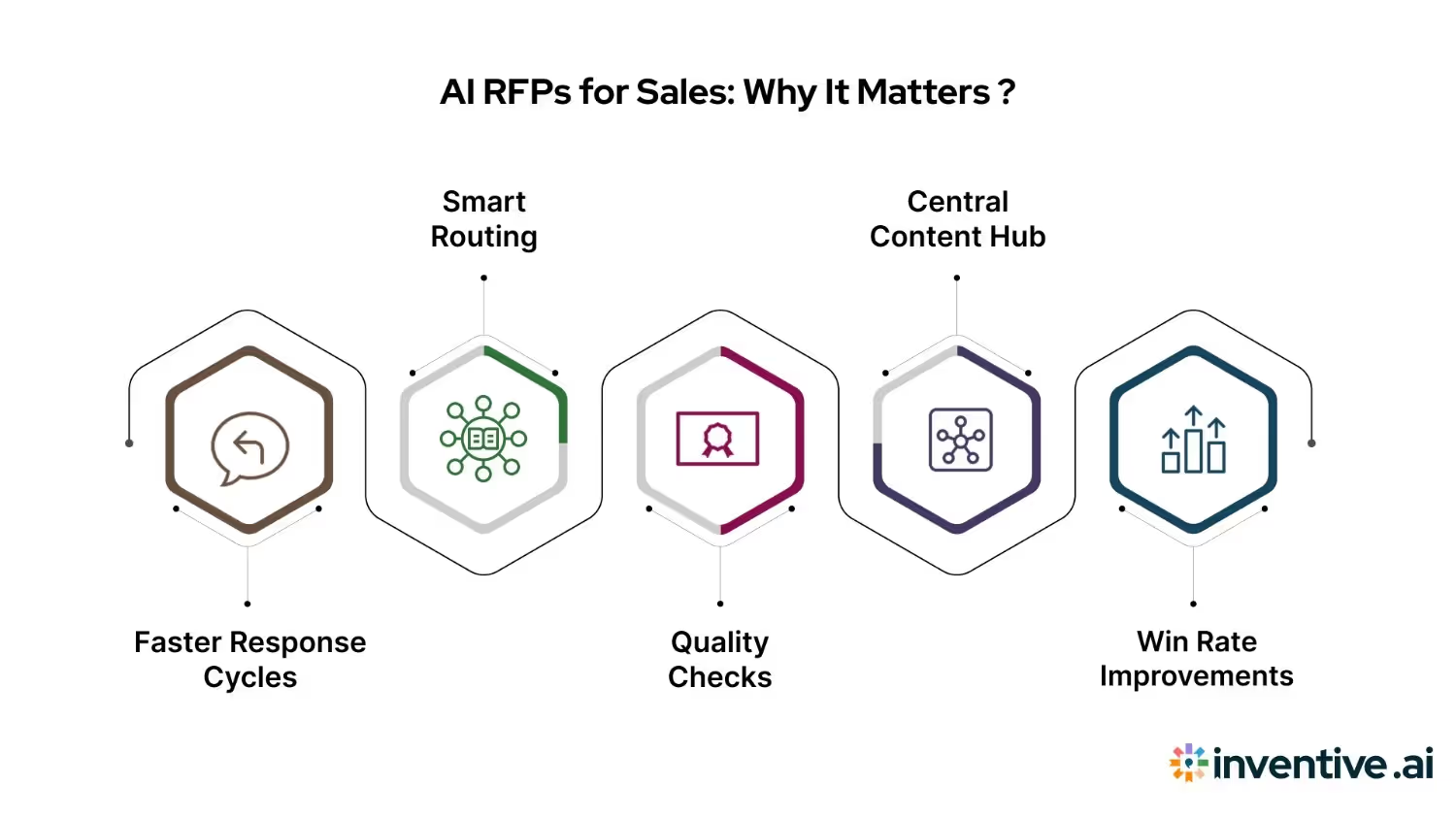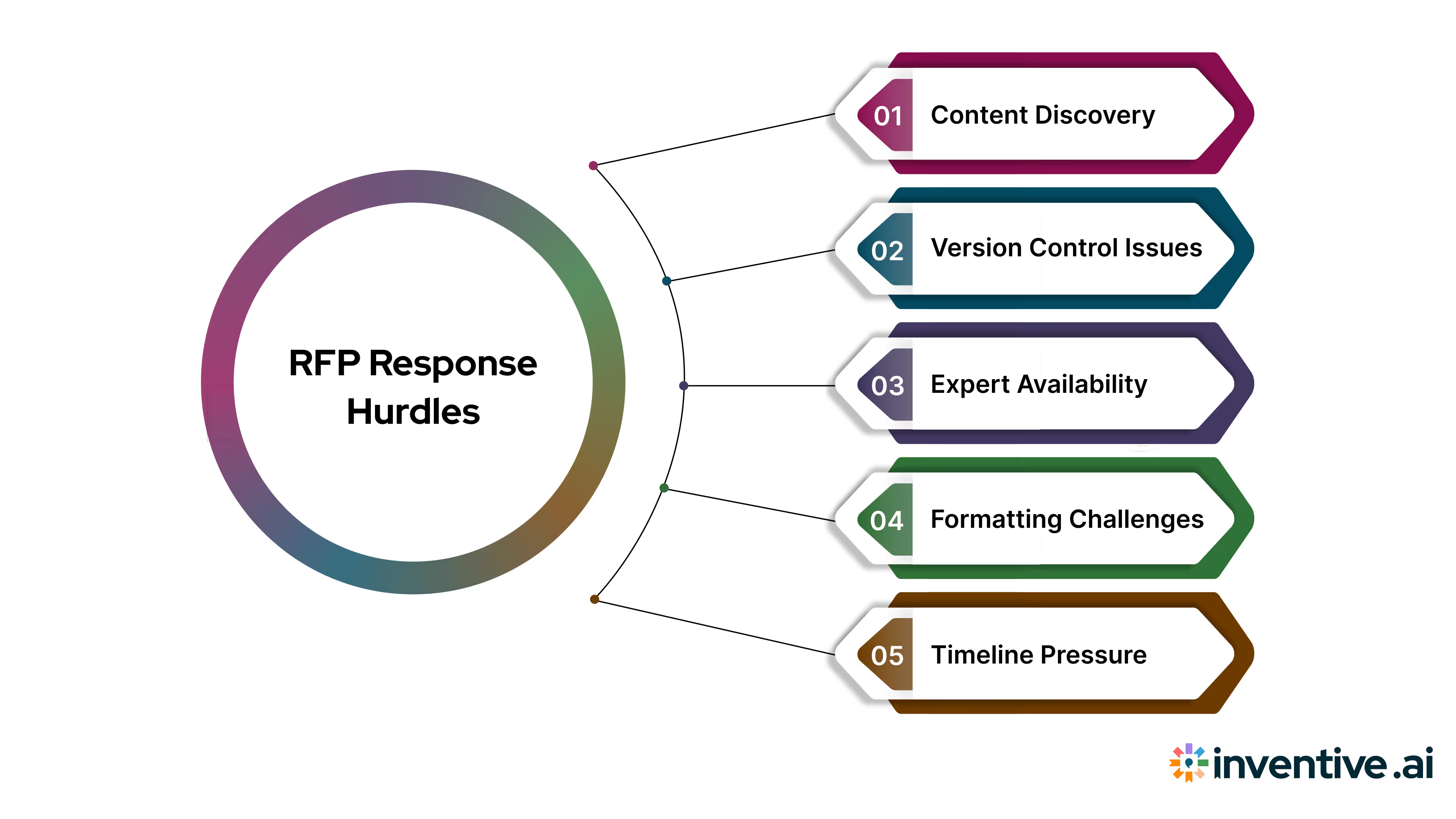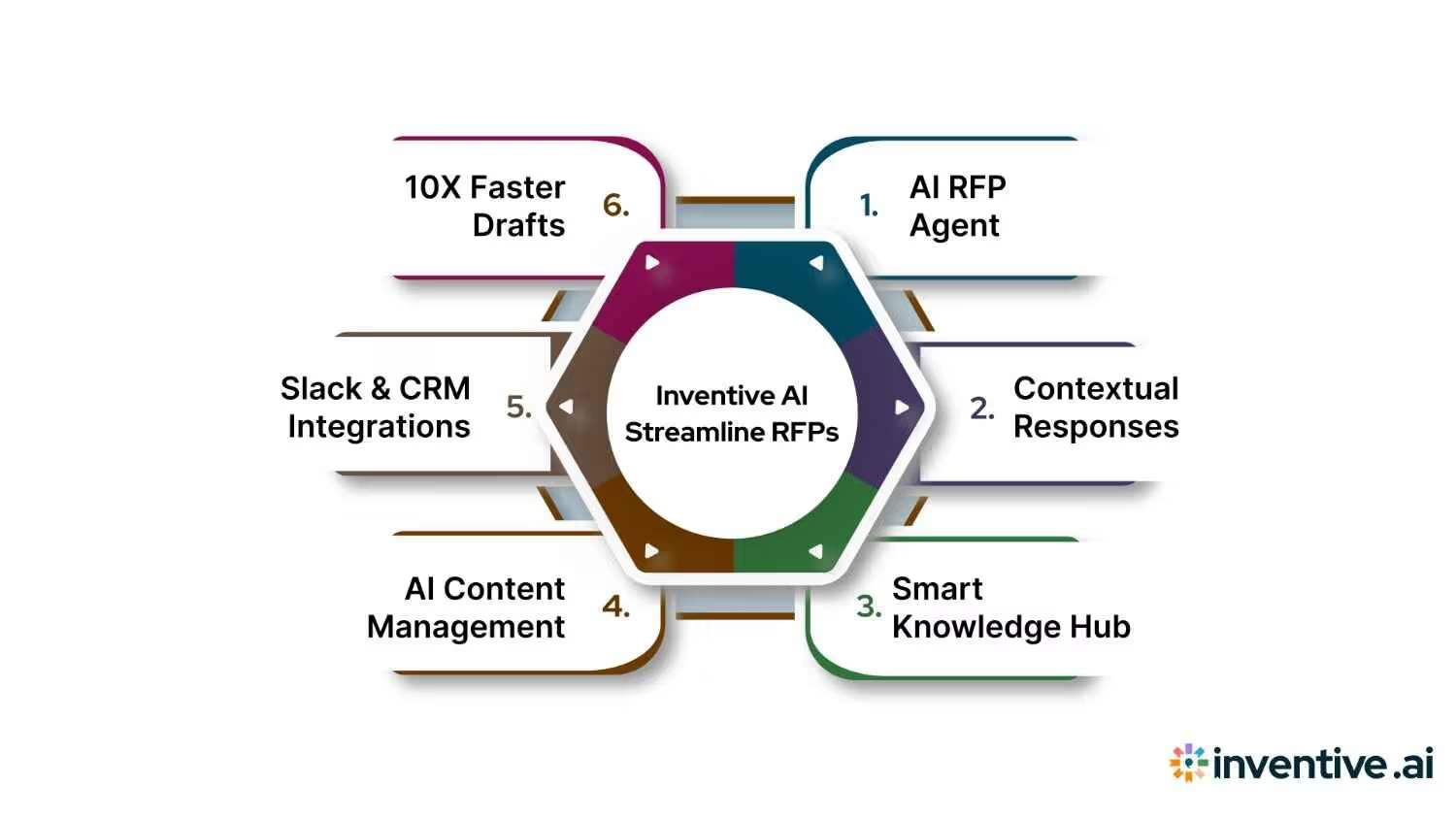Top 5 Examples of Sales RFP Workflow Automation with AI
Learn how AI speeds up sales RFP workflows with top 5 examples from different industries. See how automation reduces response time and helps you win more deals.

Your sales team just received three RFPs with tight timelines. Your proposal manager is working to assign questions to the right experts. Your technical team needs two days to review product specifications. Meanwhile, your competitor submitted their response yesterday.
This situation happens especially when teams just rely on manual workflows. According to research from HubSpot, sales professionals who exceeded 150% of their quotas use sales technology at least weekly, highlighting how automation drives performance.
Revenue leaders know that winning more deals means responding faster without sacrificing quality. The solution isn't working harder, but working smarter with AI-powered workflows. In this guide, you’ll find the top 5 examples of sales RFP workflow automation with AI.
TL;DR:
- AI helps in creating first drafts in just a few minutes instead of days, using historical response data
- Smart Question Routing automatically assigns technical, product, and business questions to the right experts.
- AI flags missing sections and formatting errors before submission, preventing last-minute scrambling and rejected proposals.
- Content hubs solve version control chaos by keeping all team members working from the same updated information automatically.
- Integration with existing tools like Slack, Google Drive, and CRM systems means no workflow disruption during the implementation of AI systems.
What is a Sales RFP Workflow with AI?
A sales RFP workflow is the structured process teams use to respond to RFP (Request for Proposal) documents. It includes analyzing requirements, drafting responses, routing questions to experts, reviewing content, and submitting final proposals.
The automated Sales RFP workflows differ from generic proposal processes because they focus on speed, accuracy, and competitive positioning. These workflows must handle high volumes while maintaining quality standards that win deals.
For instance, when an AI system detects cybersecurity questions, it automatically assigns them to your IT team. Product feature questions go to solutions engineers. Pricing sections route to sales operations. This intelligent routing removes the email chaos that slows down response times.
These AI-powered workflows create the foundation for faster, more accurate RFP responses that win more deals. Let’s understand the importance of sales RFP workflow automation with AI in more detail.
Why Do Sales Teams Need AI-Powered RFP Workflows?
Manual RFP processes create bottlenecks that cost deals. When your team spends three days searching for content, formatting responses, and chasing approvals, competitors gain the advantage. High-pressure deadlines combined with high-volume requests create error-prone workflows that hurt win rates.
AI-powered workflows solve these problems by addressing key challenges:

- Faster Response Cycles: AI drafts responses in seconds using your historical data and approved content. No more starting from scratch for common questions.
- Smart Routing: Questions automatically go to the right experts based on keywords and content analysis. Your product team gets technical questions while sales operations handles pricing.
- Quality Checks: AI flags missing sections, formatting errors, and incomplete answers before submission. No more last-minute panic about missed requirements.
- Central Content Hub: Stop reinventing answers for similar questions. AI pulls from your knowledge base to reuse winning responses across multiple RFPs.
- Win Rate Improvements: Higher-quality submissions with consistent messaging lead to better outcomes. Teams also benefit from AI in the RFP process through improved consistency and speed.
Building on these benefits, real-world examples show how different industries implement AI workflows to solve specific challenges.
Real-World Sales RFP Workflow Examples
These examples are based on actual sales workflows across different verticals. Each shows how AI handles specific challenges that manual processes can't solve efficiently.
1. SaaS Sales Workflow Using AI
Scenario: Mid-stage SaaS startup responding to 10+ RFPs per month for project management software.
Challenge: Small team, tight deadlines, repetitive questions about features and security.
AI Workflow:
- RFP Analysis: AI analyzes questions and generates the first draft using historical responses within 5 minutes.
- Smart Routing: Security questions auto-route to the CTO for review while product questions go to solutions engineers.
- Content Assembly: Final assembly pulls from an approved knowledge base with consistent messaging.
- Submission Management: Complete response ready in 4 hours instead of 4 days.
Result: Response time improved significantly with higher win rates through consistent messaging.
2. IT Services Firm Sales Team Workflow
Scenario: Regional IT services firm bidding for federal and state technology projects.
Challenge: Complex requirements, multiple stakeholders, strict formatting rules.
AI Workflow:
- Document Parsing: AI parses RFP documents and identifies key requirements automatically.
- Keyword Matching: Questions connect to existing proposal libraries through intelligent matching.
- Go/No-Go Scoring: AI scores opportunities based on past performance and requirements fit.
- Auto-Population: Standard sections populate automatically from approved content libraries.
- Quality Control: Formatting checklist generated automatically before submission.
Result: Substantial reduction in preparation time with improved format accuracy and increased bid volume.
3. Enterprise Sales Team Workflow (Healthcare)
Scenario: Healthcare technology company responding to hospital system RFPs.
Challenge: Multi-team collaboration, regulatory requirements, clinical workflow integration.
AI Workflow:
- Team Notification: Slack integration notifies relevant teams when the RFP arrives.
- Content Routing: Clinical requirements route to the medical affairs team, while technical architecture questions go to the solutions architects.
- Data Integration: Pricing sections auto-populate from CRM data with deal-specific adjustments.
- Knowledge Management: SharePoint integration maintains one central knowledge base across all responses.
- Portal Submission: Auto-submit to customer portals when complete with proper formatting.
Result: Dramatically faster response time with improved accuracy and higher win rates.
4. Financial Services Sales Workflow
Scenario: Fintech company responding to bank and credit union RFPs.
Challenge: Regulatory requirements, integration specifications, security audits.
AI Workflow:
- Regulatory Mapping: AI identifies regulatory requirements by jurisdiction and product type.
- Technical Matching: Integration questions matched to technical documentation automatically.
- Security Responses: Security audit responses pulled from SOC 2 reports and security documentation.
- Review Routing: The technical team receives automated alerts for complex customization requests.
- Pricing Models: Deal size and complexity determine pricing model selection automatically.
Result: Significant time savings with consistent accuracy and increased qualified opportunities.
5. Manufacturing Sales Team Workflow
Scenario: Industrial equipment manufacturer responding to procurement RFPs.
Challenge: Technical specifications, delivery timelines, warranty terms.
AI Workflow:
- Spec Matching: Technical specifications auto-matched to product catalogs and documentation.
- Timeline Calculation: Delivery timelines are calculated from manufacturing capacity and current orders.
- Warranty Processing: Warranty terms pulled from standard libraries with customization options.
- Engineering Review: Complex customization requests route to the engineering team automatically.
- Proposal Assembly: Complete proposals assembled with CAD drawings and technical specifications.
Result: Faster proposal generation with improved technical accuracy and higher win rates.
These different examples show how AI workflows adapt to different industries while solving common RFP response challenges.
Now, let’s see how the implementation of AI RFP workflows benefits every industry.
Industry Comparison of AI RFP Workflow Benefits
Across industries and sales functions, the challenges of responding to RFPs may look different, but the underlying inefficiencies are often the same. Whether it's managing high volumes, maintaining accuracy, or coordinating across teams, delays and inconsistencies cost time and deals. That’s where AI RFP automation becomes essential.
Here’s a breakdown of how AI helps different teams and industries tackle their most common RFP response issues.
This is the difference between managing proposals reactively and operating with a repeatable, smart system. Let’s take a closer look at how automated workflows stack up against normal RFP response workflows.
How AI Workflows Compare to Traditional RFP Response Processes
AI workflows solve fundamental problems that make manual processes inefficient and error-prone. The comparison highlights where automation creates the biggest impact.
Understanding these differences helps teams identify where AI can create the most value in their current processes. But it’s also worth looking at the common challenges to implement it effectively.
RFP Response Workflow Challenges
RFP processes create bottlenecks that hurt competitive positioning. Revenue teams lose valuable time on repetitive tasks instead of focusing on strategy and relationship building.
Common challenges include:

- Content Discovery: Teams spend hours searching through old proposals, shared drives, and email threads to find relevant responses. Information sits in silos across different systems.
- Version Control Issues: Multiple people editing the same document creates conflicts. Last-minute changes introduce errors that slip through review processes.
- Expert Availability: Subject matter experts get pulled into every RFP, creating delays when they're unavailable. Knowledge doesn't transfer to other team members.
- Formatting Challenges: Each customer has different requirements for structure, file types, and submission methods. Manual formatting takes hours and introduces errors.
- Timeline Pressure: Tight timelines force teams to rush through responses without proper review. Quality suffers when speed becomes the only priority.
AI automation solves these problems by creating structured workflows that don't depend on individual availability or manual coordination.
How AI and Automation Help in RFP Response Workflows
AI addresses workflow bottlenecks by automating repetitive tasks and providing intelligent guidance throughout the response process. These improvements compound to create significant time savings and quality improvements.
- Content Suggestion: AI pulls winning answers from past successful bids and matches them to current questions. Your team builds on proven responses instead of starting from scratch.
- Auto-Drafting: AI writes first drafts using your company voice and historical data. Writers focus on customization and strategy rather than basic content creation.
- Collaboration Routing: Questions automatically go to the right subject matter experts based on content analysis. No more guessing who should handle technical or business sections.
- Go/No-Go Insights: AI predicts win probability using past performance data and RFP requirements. Sales teams make informed decisions about which opportunities to pursue.
These AI capabilities work together to create workflows that are both faster and more effective than manual processes. According to findings from Statista, 85% of business leaders report that AI-driven automation creates value by boosting productivity and operational efficiency, validating the strategic importance of these technologies. Teams can also use RFP automation to further streamline their response processes.
How Inventive AI Speeds Up Your Sales RFP Workflow?
Sales and proposal teams often work under tight timelines. The manual approach to RFP responses creates missed opportunities.
Inventive AI brings structure, speed, and scale to your RFP workflow:

- AI RFP Agent: Auto-drafts responses using your historical data and approved content. First drafts appear in minutes, not days.
- Contextual Responses: AI Context Engine uses deal information, customer research, and RFP requirements to create highly relevant answers tailored to each opportunity.
- Smart Knowledge Hub: Connects to Google Drive, SharePoint, Notion, and other systems to create a single source of truth for all your content.
- AI Content Management: AI flags outdated content and conflicting information before it reaches customers. Your knowledge base stays current automatically.
- Slack and CRM Integrations: Seamless collaboration with your existing tools. Teams stay aligned without changing their workflows.
- 10X Faster Drafts: Improves efficiency by up to 70% while maintaining quality and consistency across all proposals.
Teams using Inventive AI see immediate improvements in their RFP response workflows and overall productivity:
"Thank you for building this tool. I am so pumped. Overall, my RFP workflow is SO much faster now with Inventive. My day was a lot less stressful using Inventive."
— Anthony Pukal, Solutions Consultant
With Inventive AI, your sales team can stop wasting time searching for content and start focusing on closing deals.
The impact of these AI capabilities extends beyond time savings to create measurable improvements in win rates and team productivity.
Final Thoughts
Sales RFP workflow automation with AI shows how revenue teams can respond faster and win more deals. From SaaS startups to enterprise healthcare companies, AI automation transforms manual processes into competitive advantages.
The key is choosing workflows that integrate with your existing systems while providing intelligent automation for drafting, routing, and quality control.
Inventive AI helps sales teams implement these workflows without disrupting current processes. Schedule a demo to see how AI can significantly enhance your RFP response workflow.
FAQs
1. How long does it take to set up AI RFP workflows?
Most teams can implement basic AI workflows in 2-3 weeks. Full integration with existing systems typically takes 4-6 weeks, depending on complexity.
2. Can AI workflows handle industry-specific requirements?
Yes, AI systems learn from your historical responses and industry documentation. They flag specific requirements and route them to appropriate experts.
3. What happens if AI generates incorrect responses?
AI systems provide confidence scores and citations for all responses. Teams review and edit drafts before submission, maintaining quality control.
4. Can small sales teams benefit from AI RFP workflows?
Small teams often see the biggest impact because AI handles tasks that would otherwise require additional headcount. The efficiency gains are proportionally higher.
5. How do AI workflows integrate with existing CRM systems?
Modern AI platforms integrate with Salesforce, HubSpot, and other CRM systems through APIs. Deal information flows automatically without manual data entry.

90% Faster RFPs. 50% More Wins. Watch a 2-Minute Demo.
Understanding that sales leaders struggle to cut through the hype of generic AI, Mukund focuses on connecting enterprises with the specialized RFP automation they actually need at Inventive AI. An IIT Jodhpur graduate with 3+ years in growth marketing, he uses data-driven strategies to help teams discover the solution to their proposal headaches and scale their revenue operations.
Recognizing that complex RFPs demand deep technical context rather than just simple keyword matching, Vishakh co-founded Inventive AI to build a smarter, safer "RFP brain." A published author and researcher in deep learning from Stanford, he applies rigorous engineering standards to ensure that every automated response is not only instant but factually accurate and secure.

.jpeg)
